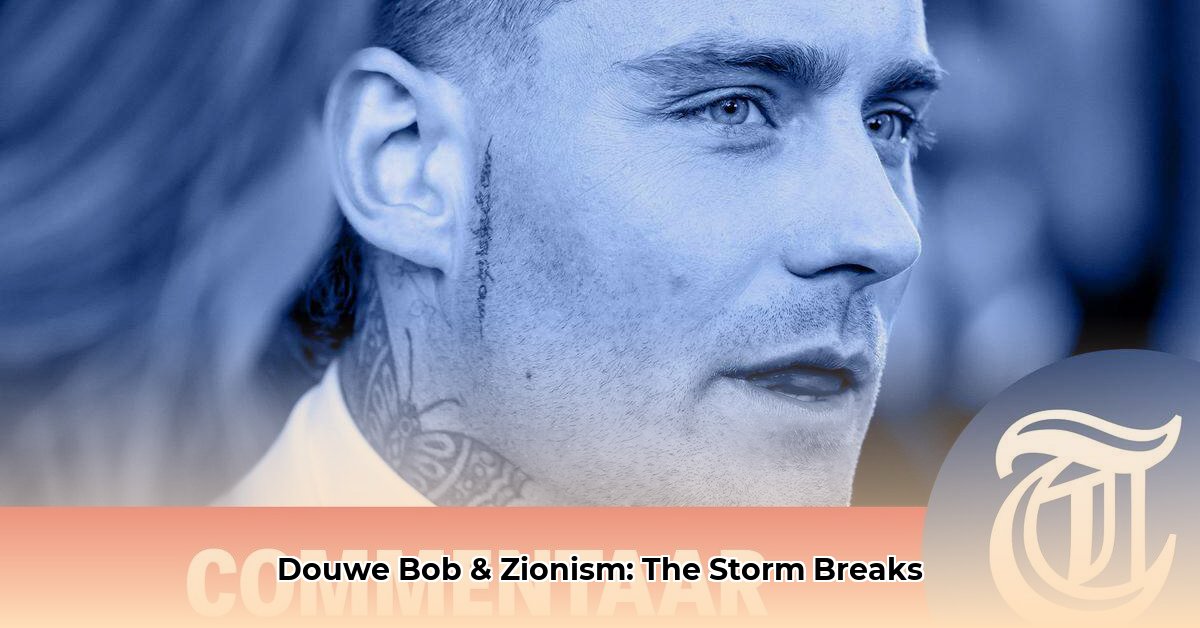
The Cancellation and its Aftermath
Singer Douwe Bob's abrupt withdrawal from a Jewish children's event in Amsterdam sparked a maelstrom of controversy. His stated reason—the presence of "Zionist propaganda"—ignited a debate that transcended national borders, raising critical questions about free speech, antisemitism, and the complexities of the Israeli-Palestinian conflict. The incident, far from a simple cancellation, became a flashpoint exposing deep-seated tensions and conflicting interpretations of Zionism itself. The fallout, including credible death threats against Bob, underscored the intensity of the emotions involved. How did this seemingly minor event escalate so dramatically?
The initial reports focused on Douwe Bob’s claim of encountering “Zionist propaganda” at the event. This vagueness became a central point of contention. What, exactly, constituted this propaganda in his view? Was it overt political messaging, subtle symbolism, or a perceived atmosphere supporting a particular perspective? This lack of clarity fueled diverse and often conflicting interpretations. Some interpreted his actions as a principled stand against injecting politics into a children's event, while others viewed it as a thinly veiled form of antisemitism.
Competing Perspectives and Interpretations
The controversy quickly divided public opinion. Supporters argued that Douwe Bob was simply upholding a pre-agreed condition of his performance—a commitment to an apolitical environment. They saw his actions as consistent with a commitment to his contractual obligations. Conversely, his critics argued his withdrawal was not only inappropriate but also implied antisemitic sentiments, given the context of a Jewish children's gathering. This interpretation linked his statement to historical and contemporary instances of anti-Jewish sentiment, highlighting the potential for unintended harm and the pain inflicted on those who experienced his actions as discriminatory. This fundamental disagreement about the intent and impact of Douwe Bob's actions forms the heart of the controversy.
One striking aspect is the ambiguous nature of the term “Zionist propaganda.” What does it actually mean? There is no universally agreed-upon definition. For some, it represents any expression of support for the State of Israel, regardless of context. For others, it implies a deliberate attempt to manipulate public opinion or perpetuate a biased narrative. This variance in understanding fuels the ongoing debate and contributes to the intensity of the response to Douwe Bob's actions. The absence of a clear definition emboldens conflicting interpretations, preventing any straightforward resolution.
Historical and Socio-Political Context
The Douwe Bob incident cannot be divorced from its broader historical and socio-political context. The Israeli-Palestinian conflict casts a long shadow over the debate, with strongly held views on both sides. The very definition of Zionism – its aims, achievements and perceived shortcomings – is fundamentally contested. For many, it represents the establishment of a Jewish homeland, a triumph of self-determination. For others, it’s inextricably linked to the dispossession and ongoing suffering of the Palestinian people. This complex history infuses the debate with deep emotion and often makes rational discourse extremely difficult. Understandably, these historical realities heavily affect the interpretation of Douwe Bob's actions.
Isn't it curious how such a seemingly minor event can unleash such a powerful wave of reaction? What does this tell us about the fragility of social harmony when dealing with such sensitive topics? This incident compels us to reflect on the importance of sensitive, nuanced communication. The deeply felt emotions on both sides of the issue prevent straightforward resolutions.
Stakeholder Analysis and Implications
The consequences of Douwe Bob's actions reverberated across various stakeholders:
Douwe Bob: Faced with severe reputational damage and credible death threats, his future career remains uncertain. The long-term impact on his public image and professional life is yet to be fully determined.
The Jewish Community: The event heightened feelings of vulnerability and insecurity within the community. This added to pre-existing worries about antisemitic incidents, requiring a re-evaluation of security measures.
Dutch Media: The controversy pushed Dutch media outlets to critically examine their own reporting on the Israeli-Palestinian conflict. It highlighted the need for responsible and balanced coverage of complex and highly sensitive topics.
Dutch Government: The incident placed pressure on the government to clarify and strengthen legislation related to hate speech, and to explore how freedom of speech can be balanced with the protection of minority groups from hate. This may necessitate a comprehensive review of existing legal frameworks.
The fact that such a controversy could arise from such a seemingly small event is itself a poignant reminder of the potent and often polarising nature of the Israeli - Palestinian conflict. How can we better understand the sensitivities surrounding this enduring conflict?
Conclusion: The Urgent Need for Dialogue
The Douwe Bob controversy serves as a stark reminder of the delicate balance between freedom of expression and the prevention of harmful rhetoric. The ambiguity surrounding the term "Zionist propaganda," coupled with the deeply emotional context of the Israeli-Palestinian conflict, created a perfect storm of misunderstanding and misinterpretation. The incident highlights the urgent need for improved understanding, more nuanced public discourse, and greater efforts to promote tolerance and mutual respect. Moving forward, fostering open and respectful dialogue—one that allows critical examination of Israeli governmental policies without succumbing to hateful tropes—becomes a crucial step towards building a more inclusive and understanding society. Such dialogue requires a shared commitment to accurate information and a willingness to engage with differing perspectives free from fear and intimidation.